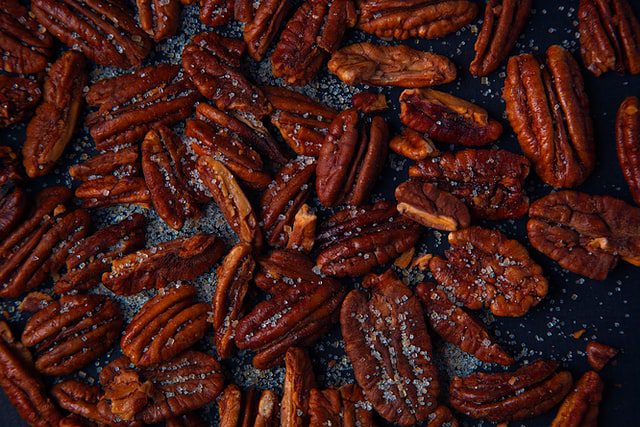When it comes to finding the perfect, most prosperous pecan tree, there’s a lot more to consider than just the species. While species can play a role in overall adaptability to your soil, nut bearing types, pollination types and so much more can impact your harvest.
Here at Georgia Pecan Nursery, we understand that your pecan nut harvest is important to you. Which is why we’ve compiled a list of just a few things for you to consider before purchasing your next pecan tree. To learn more about pecan tree species, pollination conditions and more, keep reading.
Here’s how to plant prosperous pecan trees:
- Nut Bearing Types
- Recommended Pecan Tree Species
- Pollination Type
- Nut Size & Quality
- Georgia Pecan Nursery
Nut Bearing Types
To have a prosperous harvest, you’ll need to first consider nut type before buying or planting a tree. If you decide to purchase pecan trees, you’ll need to understand that not all tree types produce nuts at the same time. A tree’s precocity can also be defined as the age at which it bears nuts.
Precocious pecan trees begin bearing fruits at a relatively young age. While early precocious trees might produce nuts at a younger age, the quality can often decrease over time if not properly cared for. When you purchase a pecan tree from a Georgia Pecan Nursery, our team will not only ensure you find the right nut bearing trees for your needs, but we can help troubleshoot any negative tree issues.
Recommended Pecan Tree Species
According to the current recommendations, Elliott, Jenkins, McMillan, and Syrup Hill pecan trees are the best for at home planting purposes. Pecan trees grown from cultivars of this type are unlikely to be negatively affected by typical plant diseases and fungi, making them ideal for harvesting. However, Bare Root Pecan Trees are often considered to be the most docile and agile of pecan plant species.
These trees are dormant plants with exposed roots that are often available for purchase December through March. During the dormant season, bare root pecan trees are removed from the field they grew up in. Once planted in a new location, Bare Root Pecan Trees are more likely to adapt readily to new soil conditions. This can be perfect for an ideal harvest or for those who are ready to hit the ground running with their pecan tree.
Visit Georgia Pecan Nursery to learn more about growing a tree of your own!
Pollination Type
Another important element to think about when purchasing your pecan trees is pollination type. In a typical pecan tree, you will notice that there are both male and female, nuts clusters, and flowers. These flowers must be pollinated to produce nuts. An ordinary tree wholesaler might not be able to identify this. When you purchase your pecan trees from a Georgia Pecan Nursery, their tree farmers will be able to direct you towards the proper type I and type II pecan trees that will suit your needs.
These are the two types of pollinating pecan trees to be aware of:
- Type I: These pecan trees release pollen from the catkins, but the nut clusters don’t become receptive until later.
- Type II: These pecan trees become receptive to the pollen before the catkins release the pollen. This means pecan trees are more likely to be pollinated and produce more nuts when they are grouped together with different varieties.
Nut Size & Quality
When choosing the most prosperous pecan tree species for your unique needs, understanding nut size and quality can affect your decisions. Whether you need large nuts, large quantities, or you’re looking for a smaller harvest to enjoy at home, nut size and quality can be affected by the tree species.
This process can often be a delicate balance. Larger nuts mean less nuts to sell for more profit by the pound. However, larger nuts are sometimes harder to fill while still maintaining high quality kernels. Depending on your needs, the experts at Georgia Pecan Nursery can help you determine the tree that’s right for your orchard.
Georgia Pecan Nursery
With the help of a Georgia Pecan Nursery, you’ll be able to determine the best nut size and quality for your pecan tree production needs. Oftentimes, with various types of pecan tree varieties, cross pollination is also an option. In order to create and cultivate the nut yield you need, purchase your trees from a Georgia Pecan Nursery.
If you’re looking to purchase a variety of pecan tree types or you’re looking for more information to help care for your Georgia pecan trees, Contact Georgia Pecan Nursery today!

